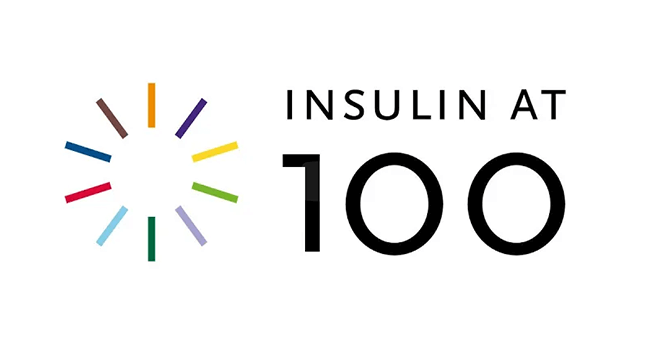Celebrating 100 years of insulin
About 100 years ago, the discovery of insulin fundamentally changed how diabetes is treated. From improved insulin formulas to glucose monitoring to automated insulin delivery, there have been many inventions over the last century. Medtronic is pleased to have contributed to innovations that have made meaningful improvements to how diabetes is managed.
Celebrating 100 years of insulin is not just about celebrating the past, but about celebrating the future. The means of delivering insulin has evolved from glass syringes to smart insulin pens — from backpack pumps to advanced hybrid closed loop systems that fit on the hip.
Milestone Timeline
Some of the key advancements that have occurred in diabetes research over the past 100 years with Medtronic pioneering many of the "firsts" and transforming diabetes care.
Leonard Thompson at Toronto General Hospital becomes the first person with diabetes to be treated with insulin when he was just 14 years old.

- Researchers identified two distinctive types of diabetes: type 1 diabetes and type 2 diabetes.
- The first disposable plastic syringe was available. People with diabetes could stop boiling metal needles and glass syringes for each injection of insulin.

- The first successful pancreas transplant took place.
- Portable glucose meters were introduced.
- A1C tests became standard.
The first synthetic insulin was produced.
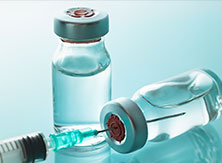
- MiniMed launches their 1st insulin pump
- The first insulin pen was introduced.
- Home blood glucose meter launched.
- MiniMed continues innovation on insulin pumps and infusion sets.
- Start of clinical trials for glucose sensor.
FDA approves the first-ever physician-use CGM system from Medtronic.
Medtronic acquires MiniMed and furthers the advancements in diabetes care.
- Medtronic launches 1st CGM for personal use.
- Medtronic launches world’s 1st sensor-augmented insulin pump.
- Medtronic launches 1st automatic suspend insulin at preset target insulin pump**.
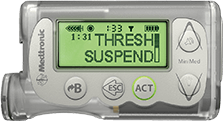
Medtronic launches 1st predictive insulin suspend algorithm in an insulin pump.
Medtronic launches 1st hybrid closed loop insulin pump system that automatically* delivers basal insulin.
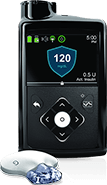
- Medtronic launches new insulin pump with 5-minute auto-correction boluses
- Medtronic launches Integrated smart† insulin pen with real-time CGM. This system provides real-time glucose readings alongside insulin dose information.
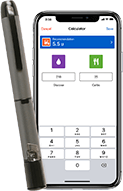
Medtronic launches insulin pump system with Meal Detection™ technology‡ that can automatically deliver correction§ boluses of insulin as quickly as every 5 minutes.Ω
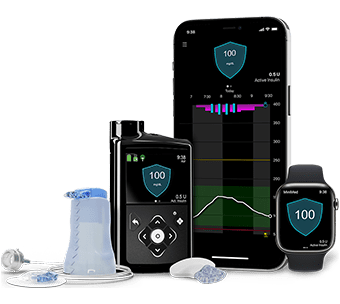
Our commitment to innovation for the future
Medtronic remains committed to research and innovation as we play our part in reducing the burden of living with diabetes with solutions for all the ways people want to manage their diabetes around the world.
Medtronic is working together with the global community to change the way people manage diabetes. We aim to transform diabetes care by expanding access, integrating care and improving outcomes, so people living with diabetes can enjoy greater freedom and better health.
“We want to be an extraordinary partner for those living with diabetes. Our goal is to empower people to live life on their terms, provide support in the ways they need it, and deliver innovation that truly matters. We are committed to making the lives of those living with diabetes easier.”
Que Dallara, EVP & President, Diabetes Operating

Outcomes that matter
Support you can count on
Innovation for the future
* Refers to SmartGuard™ Auto Mode. Some user interaction required. Individual results may vary.
** Approved for use only outside the US
† Smart insulin pens connect to a mobile app to provide dosing calculations, reminders and CGM system integration.
‡ Taking a bolus 15 – 20 minutes before a meal helps to keep blood sugar levels under control after eating.
Ω Refers to SmartGuard™ feature. Individual results may vary.
Φ Smart devices sold separately. For a list of compatible devices, visit http://bit.ly/CheckDevices
Important safety information: MiniMed™ 780G system with SmartGuard™ technology with Guardian™ 4 sensor
The MiniMed™ 780G system is intended for continuous delivery of basal insulin at selectable rates, and the administration of insulin boluses at selectable amounts for the management of type 1 diabetes mellitus in persons seven years of age and older requiring insulin as well as for the continuous monitoring and trending of glucose levels in the fluid under the skin. The MiniMed™ 780G system includes SmartGuard™ technology, which can be programmed to automatically adjust insulin delivery based on the continuous glucose monitoring (CGM) sensor glucose values and can suspend delivery of insulin when the sensor glucose (SG) value falls below or is predicted to fall below predefined threshold values.
The Medtronic MiniMed™ 780G system consists of the following devices: MiniMed™ 780G insulin pump, the Guardian™ 4 transmitter, the Guardian™ 4 sensor, One-press serter, the Accu-Chek™ Guide Link blood glucose meter, and the Accu-Chek™ Guide test strips. The system requires a prescription from a healthcare professional.
The Guardian™ 4 sensor is intended for use with the MiniMed™ 780G system and the Guardian 4 transmitter to monitor glucose levels for the management of diabetes. The sensor is intended for single use and requires a prescription. The Guardian™ 4 sensor is indicated for up to seven days of continuous use.
The Guardian™ 4 sensor is not intended to be used directly to make therapy adjustments while the MiniMed™ 780G is operating in manual mode. All therapy adjustments in manual mode should be based on measurements obtained using a blood glucose meter and not on values provided by the Guardian™ 4 sensor. The Guardian™ 4 sensor has been studied and is approved for use in patients ages 7 years and older and in the arm insertion site only. Do not use the Guardian™ 4 sensor in the abdomen or other body sites including the buttocks, due to unknown or different performance that could result in hypoglycemia or hyperglycemia.
WARNING: Do not use the SmartGuard™ feature for people who require less than 8 units or more than 250 units of total daily insulin per day. A total daily dose of at least 8 units, but no more than 250 units, is required to operate in the SmartGuard™ feature.
WARNING: Do not use the MiniMed™ 780G system until appropriate training has been received from a healthcare professional. Training is essential to ensure the safe use of the MiniMed™ 780G system.
WARNING: Do not use SG values to make treatment decisions, including delivering a bolus, while the pump is in Manual Mode. When the SmartGuard™ feature is active and you are no longer in Manual Mode, the pump uses an SG value, when available, to calculate a bolus amount. However, if your symptoms do not match the SG value, use a BG meter to confirm the SG value. Failure to confirm glucose levels when your symptoms do not match the SG value can result in the infusion of too much or too little insulin, which may cause hypoglycemia or hyperglycemia.
Pump therapy is not recommended for people whose vision or hearing does not allow for the recognition of pump signals, alerts, or alarms. The safety of the MiniMed™ 780G system has not been studied in pregnant women, persons with type 2 diabetes, or in persons using other anti-hyperglycemic therapies that do not include insulin. For complete details of the system, including product and important safety information such as indications, contraindications, warnings and precautions associated with system and its components, please consult https://www.medtronicdiabetes.com/important-safety-information#minimed-780g and the appropriate user guide at https://www.medtronicdiabetes.com/download-library
Important Safety Information: Guardian™ Connect CGM System
The Guardian™ Connect system requires a prescription and is indicated for continuous or periodic monitoring of glucose levels in the interstitial fluid under the skin, in patients (14 to 75 years of age) with diabetes mellitus. The system is intended to complement, not replace, information obtained from standard blood glucose monitoring devices, and is not recommended for people who are unwilling or unable to perform a minimum of two meter blood glucose tests per day, or for people who are unable or unwilling to maintain contact with their healthcare professional. The system requires a functioning mobile electronic device with correct settings. If the mobile device is not set up or used correctly, you may not receive sensor glucose information or alerts. For complete details of the system and its components, including warnings, contraindications, and precautions, please consult the user guide at http://www.medtronicdiabetes.com/support/download-library/user-guides and important safety information.
Important Safety Information: MiniMed™ 770G System With SmartGuard™ Technology
The MiniMed™ 770G system is intended for continuous delivery of basal insulin (at user selectable rates) and administration of insulin boluses (in user selectable amounts) for the management of type 1 diabetes mellitus in persons two years of age and older requiring insulin as well as for the continuous monitoring and trending of glucose levels in the fluid under the skin. The MiniMed™ 770G System includes SmartGuard™ technology, which can be programmed to automatically adjust delivery of basal insulin based on continuous glucose monitoring (CGM) sensor glucose values (SG) and can suspend delivery of insulin when the SG value falls below or is predicted to fall below predefined threshold values.
The Medtronic MiniMed™ 770G System consists of the following devices: MiniMed™ 770G Insulin Pump, the Guardian™ Link (3) Transmitter, the Guardian™ Sensor (3), one-press serter, the Accu-Chek® Guide Link blood glucose meter, and the AccuChek®Guide Test Strips. The system requires a prescription.
The Guardian™ Sensor (3) has not been evaluated and is not intended to be used directly for making therapy adjustments, but rather to provide an indication of when a fingerstick may be required. All therapy adjustments should be based on measurements obtained using a blood glucose meter and not on values provided by the Guardian™ Sensor (3).
All therapy adjustments should be based on measurements obtained using the Accu-Chek® Guide Link blood glucose meter and not on values provided by the Guardian™ Sensor (3). Always check the pump display to ensure the glucose result shown agrees with the glucose results shown on the Accu-Chek® Guide Link blood glucose meter. Do not calibrate your CGM device or calculate a bolus using a blood glucose meter result taken from an alternative site. It is not recommended to calibrate your CGM device when sensor or blood glucose values are changing rapidly, e.g., following a meal or physical exercise.
WARNING: Do not use the SmartGuard™ Auto Mode for people who require less than 8 units or more than 250 units of total daily insulin per day. A total daily dose of at least 8 units, but no more than 250 units, is required to operate in SmartGuard™ Auto Mode.
WARNING: Do not use the MiniMed™ 770G system until appropriate training has been received from a healthcare professional. Training is essential to ensure the safe use of the MiniMed™ 770G system.
Pump therapy is not recommended for people whose vision or hearing does not allow recognition of pump signals and alarms. Pump therapy is not recommended for people who are unwilling or unable to maintain contact with their healthcare professional. The safety of the MiniMed™ 770G system has not been studied in pregnant women. For complete details of the system, including product and important safety information such as indications, contraindications, warnings and precautions associated with system and its components, please consult https://www.medtronicdiabetes.com/important-safetyinformation#minimed-770g and the appropriate user guide at https://www.medtronicdiabetes.com/download-library
Important Safety Information: MiniMed™ InPen™
The InPen™ is a home- use reusable pen injector for single- patient use by people with diabetes under the supervision of an adult caregiver, or by a patient age 7 and older for the self- injection of a desired dose of insulin and for calculating an insulin dose or carbohydrate intake based on user entered data. A healthcare professional must assist in dosage programming of the device prior to use, based on various patient- specific criteria and targets. The InPen™ requires a prescription. For additional product and safety information, please consult the Instructions for Use and bit.ly/InPenRisks.com.
Rx only. Under age 7 requires supervision of an adult caregiver. User interaction, compatible device, proper pairing and settings required. See http://bit.ly/InPenSafety
